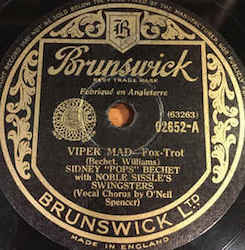
"Viper Mad" is a composition by Sidney Bechet and Rousseau Simmons; it is also known as "Pleasure Mad".
Sheet music for the composition was published in 1924 as "Pleasure Mad", performed by vocalist Blossom Seeley. [1] It was recorded by another vocalist, Ethel Waters, early that year. [2] Another version from 1924 was by Maureen Englin, with Bechet accompanying on soprano saxophone with pianist Art Sorenson, but the track was unreleased. [3] The composition was played very frequently in the 1920s, and was "virtually a jazz standard of the day". [4]
Bechet himself recorded a version as leader in 1938, with Noble Sissle's Orchestra. [5] This track, with O'Neill Spencer on vocals, features a modulating break to A-flat from G, a trumpet solo by Clarence Brereton and another Bechet modulation, to D-flat. [6] The 1938 Bechet version was used in the Woody Allen film Sweet and Lowdown . [7]
As "Viper Mad", the lyrics celebrate marijuana use, so it is listed among jazz songs, mainly of the 1930s, that were on the same topic. [8] A "viper" was a marijuana smoker, because of the hissing sound of inhalation. [9] The lyrics include: "Wrap your chops round this stick of tea / Blow this gage and get high with me / Good tea is my weakness, I know it's bad / It sends me, gate, and I can't wait, I'm viper mad".